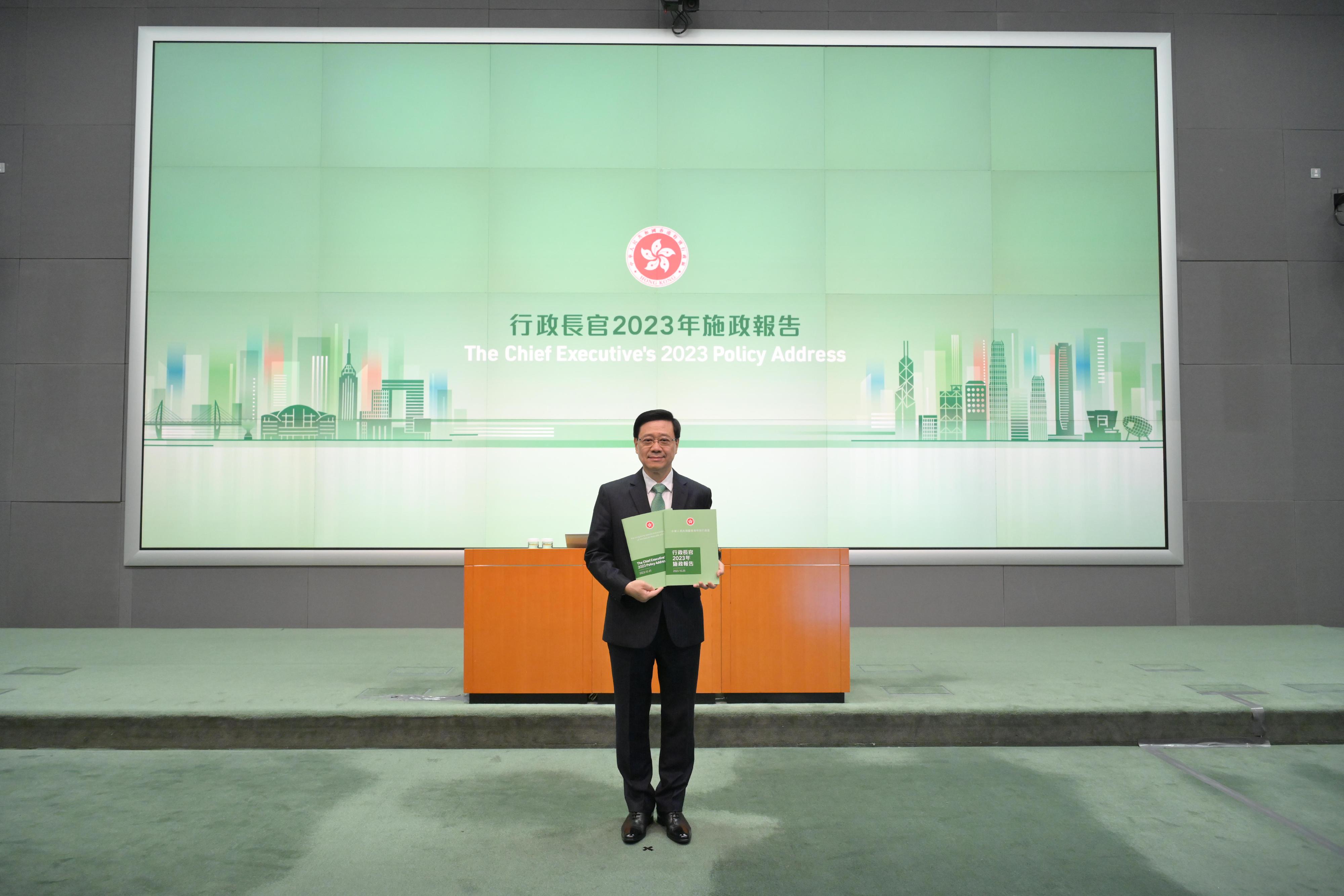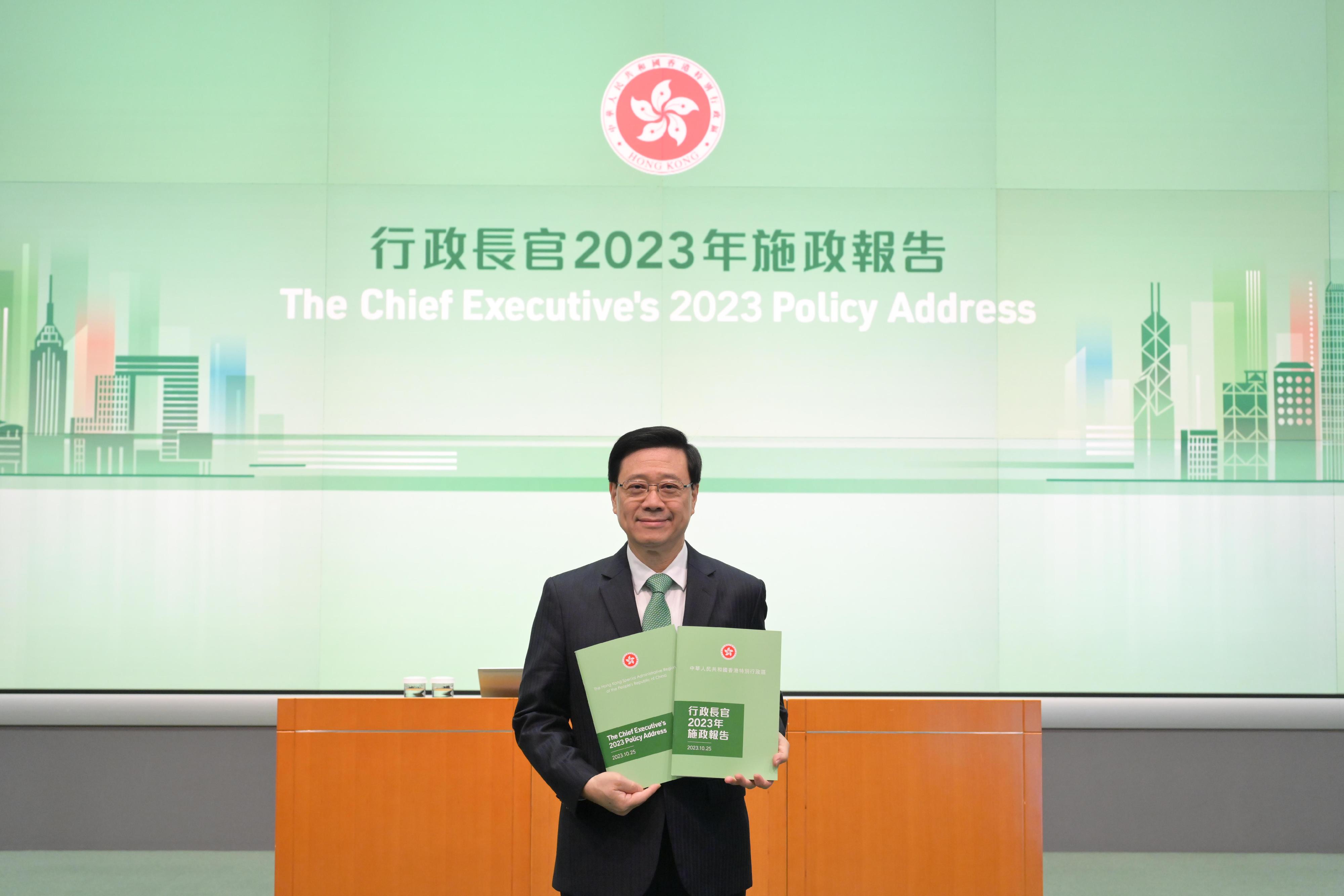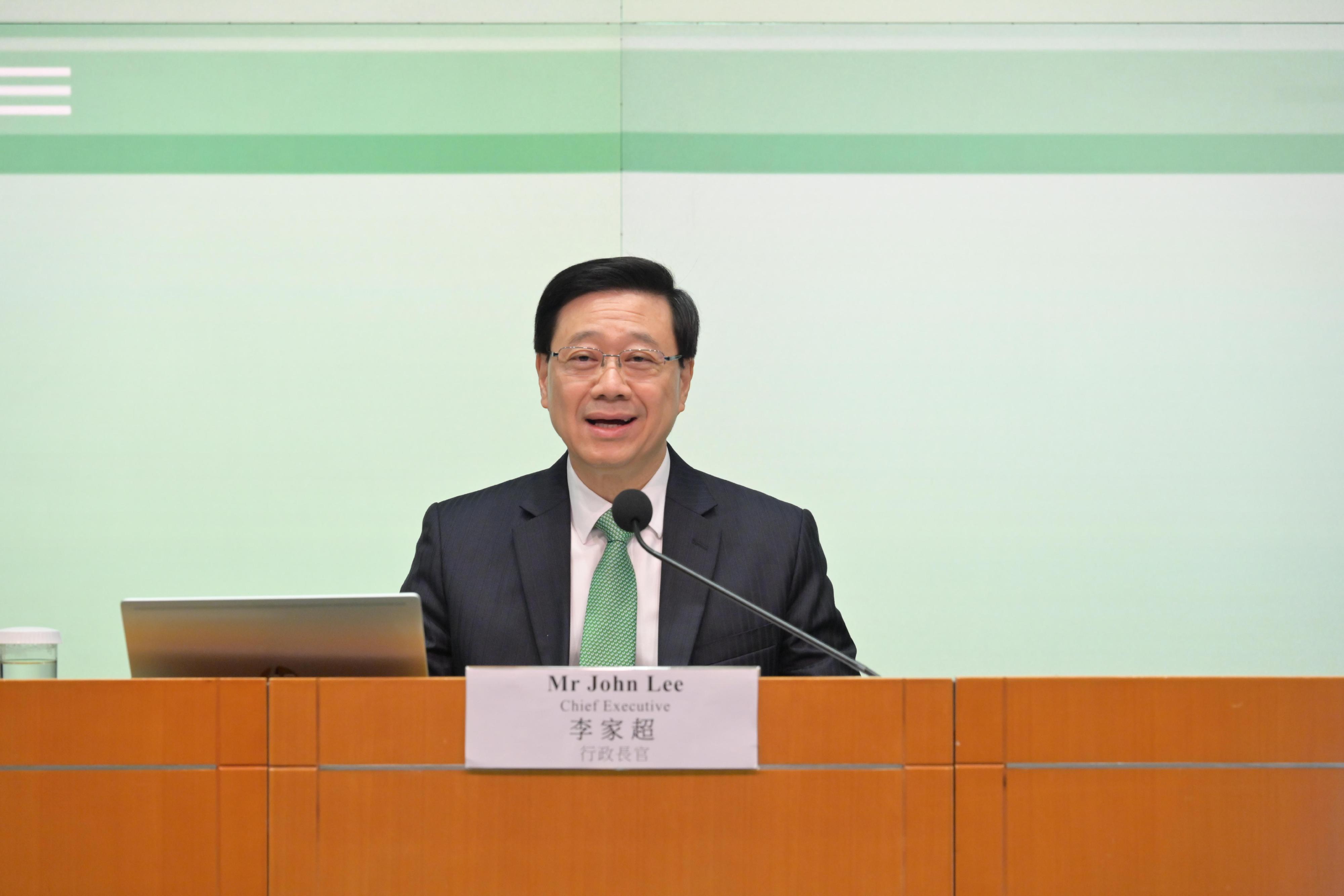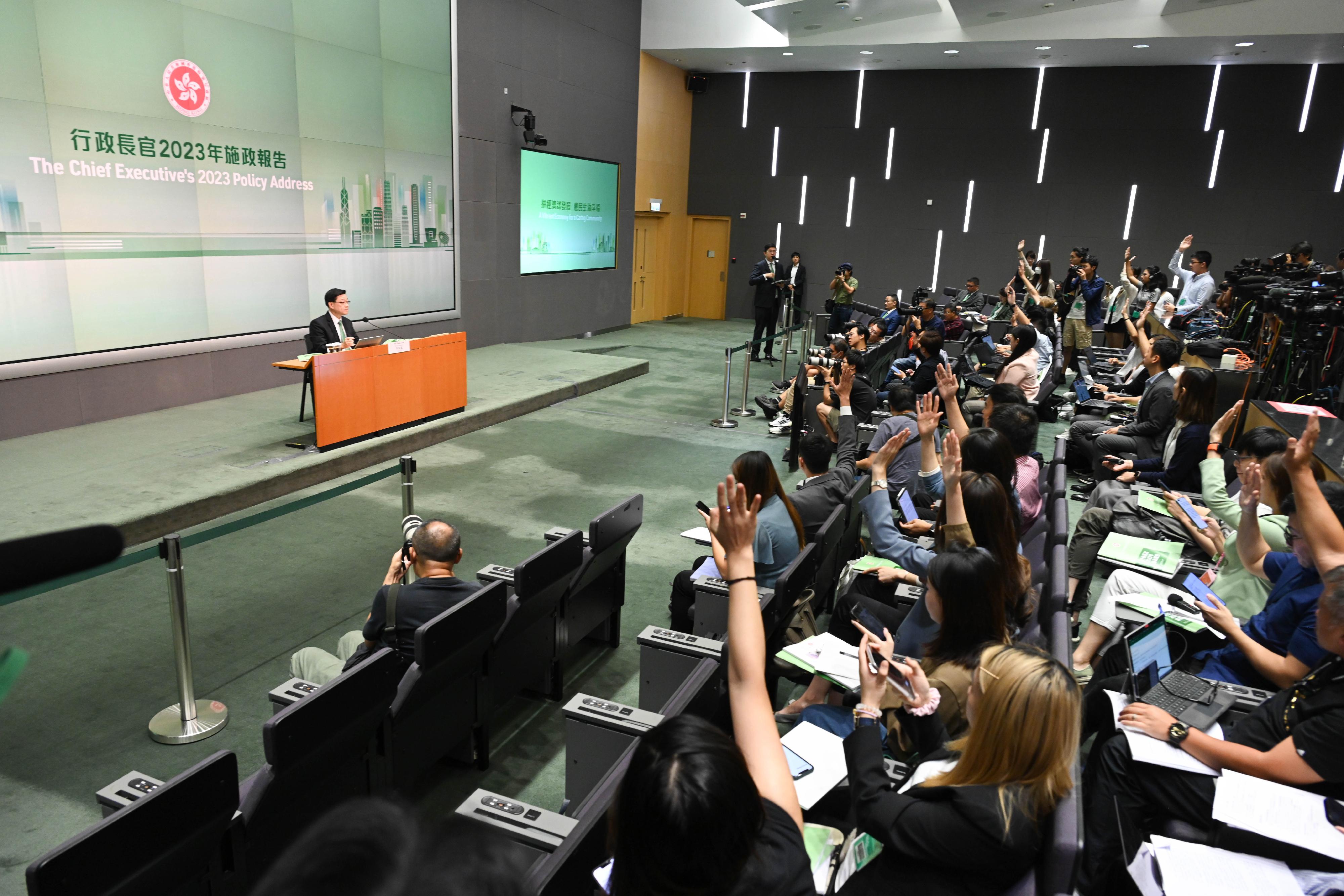Transcript of CE's press conference on "The Chief Executive's 2023 Policy Address" (with photos/video)
******************************************************************************************
Reporter: The first question is regarding the relaxing of the stamp duties in this year's Policy Address. Who's the Government targeting to help with these measures to reduce the stamp duties in terms of property? Is it prospective homeowners, developers or even current homeowners? And are you worried that these measures would overstimulate the market instead? The second question is about the overall general direction of the Policy Address. Some critics would say that your Policy Address this year does not have a strong direction to boost the local economy. Instead, the Government is seeming to rely on the property market as it has before to strengthen the economy. What do you think about this view? Thank you.
Chief Executive: When the stringent measures relating to property prices were introduced, it was a time when speculation was very high, when the trend of property prices kept going up, and also, people's attention seemed to focus on property speculation, and making quick money was the goal. After the introduction of those measures, and in the recent examination of situation, first of all, interest rate has gone up and it will remain high. Geopolitical situation is going to be complicated. The whole world is facing pressure in regard to economic development and also the property prices have already been going down from its height.
So the question the Government needs to answer is, should all these measures be made permanent or should we at some stage, look at whether there should be some changes? In my consultation I have heard a lot of suggestions, strong voices as well. Some asked for a lot to be done, or under. So the Government has to come to a decision after making an assessment of the situation of Hong Kong, which includes not just locally, but also internationally, because property market is highly affected by interest rate, by economic situation and also by sentiment. I have come to the stage after taking into consideration of all these things that it is time to relax some measures. And that is why I have done what I have announced. Is it the right balance? I think it is because it is important that at one stage when we do any change of relaxation, then we maintain stability in the market. Considering all factors, I think what I have just introduced is a right mix of measures, of some measures being retained and some measures being relaxed.
The main objective of the government policy in regard to the property is that we want the market to be stable. We do not want big changes in either side because we want people, when they make their decision about buying a property, which is one of the most important decisions for a lot of families, they will be able to make a good judgment, good decision as a result of government policy, as a result of government explanation of its assessment of the situation. And we hope that through introduction of these changes, the society of Hong Kong will know the position of the Government and then they can make a sensible decision based on their own situation.
Reporter: Good afternoon, Mr Lee. Are you concerned that the last effort in 2003 to enact Article 23 – resulted in the then largest protest in history and the resignation of top officials – do you agree or disagree with your colleagues that those demonstrations were result of foreign interference? And second, the biggest crisis facing the city is of course the climate crisis like everywhere, but your Policy Address was rather thin again on new green initiatives. The measures you announced appear to be more reactive than proactive when it comes to recent weather and the hydrogen issue is not so developed. So, with a city powered by coal, hardly any electric buses or taxis, supermarket packaging out of control, in light of the recent severe weather, why do we lag behind China on this issue?
Chief Executive: First of all, I think if you ask any governments what will be one of their priorities, then any government will say that it is to fulfil its constitutional duty. Article 23 is stated in the Basic Law, which the Hong Kong SAR Government has not been able to fulfil for over 20 years. Constitutional responsibility is one of the key areas for any government to be serious about. So yes, while we will develop economy to help people's livelihood, we cannot forget the Government also has constitutional responsibility. Without constitution, I think things will become chaotic. So yes, we will do Article 23 enactment in 2024. Any country places a strong emphasis on the protection of national security. I don't know which country you come from. I am sure your country has a lot of legislation to protect national security.
The 2019 riots, black violence, and the attempted colour revolution happened because of the obvious vacuum situation on legislation regarding national security. We have suffered badly. We have to learn this through pain. We thank the Hong Kong National Security Law for establishing the stability and security for Hong Kong, and that is why we all can now sit this peacefully to go about our day-to-day duty. If this was still 2019 when all the violence was still happening, when you could all of a sudden be grabbed by one of the black rioters, stripped, insulted and seriously beaten up, that will not allow Hong Kong to progress in any way. Yes, we will protect Hong Kong's security and national security. The Hong Kong National Security Law also requires Hong Kong to enact Article 23 as quickly as possible.
Foreign interference with Hong Kong's affairs - it is still happening. I think you don't need me to particularly point you to any examples. We will be doing consultation in regard to enactment of Article 23. We did not succeed in 2003. I would say this was because of, in some way, not being able to make people understand very properly what Article 23 can do for them in a positive way. I think after the 2019 harm and troubles, people understand how national security is an important factor for stability, for continuing our normal day-to-day life.
I think the answer is very simple. We will ensure that people will understand what the eventual legislation will do, will protect them, and will ensure that they will go about their day-to-day activities freely, happily and also without worrying about security threats, particularly national security threats.
In regard to climate change, I do not think you have read the Policy Address in good detail and also have ignored all the action plans and strategies that have been announced and are being implemented in Hong Kong. First of all, we have, a few years ago, published our action plan in regard to climate matters. We have also implemented a series of measures to encourage people to use cleaner vehicles. That is why we have some incentive schemes for people to switch from fuel-generated cars to electric cars. We have set 2050 to be the year for us to be carbon neutral. We have also set 2035 to be the year when we will reduce the carbon emission by 50 per cent compared to the 2005 standard. We have also announced that, by 2035, we will no longer allow cars which are fuel-generated to be registered. We are rolling out a lot of measures to control solid waste. We are rolling out measures to encourage recycling. We are building new power-generating facilities which will use solid waste to generate power. So we are doing a lot. We are now actively promoting installation of charging facilities for electric cars. The Policy Address introduced different measures to also make use of new energy in our vehicle fleet, also in ensuring that Hong Kong's refilling of fuel for ships will be using green energy. We are also talking about how we will develop hydrogen in vehicle fleet and other areas of green development. We have been promoting Hong Kong by making use of Hong Kong's financial centre position with a programme called Core Climate, so people can make use of our financial facilities to trade carbon emission. We have a long list of measures, and I advise you to go and also study in detail. Of course there will be other measures we will roll out either in this year or in my next year's Policy Address.
(Please also refer to the Chinese portion of the transcript.)
Ends/Wednesday, October 25, 2023
Issued at HKT 22:43
Issued at HKT 22:43
NNNN
Photo
Audio / Video
CE hosts press conference on "The Chief Executive's 2023 Policy Address"








